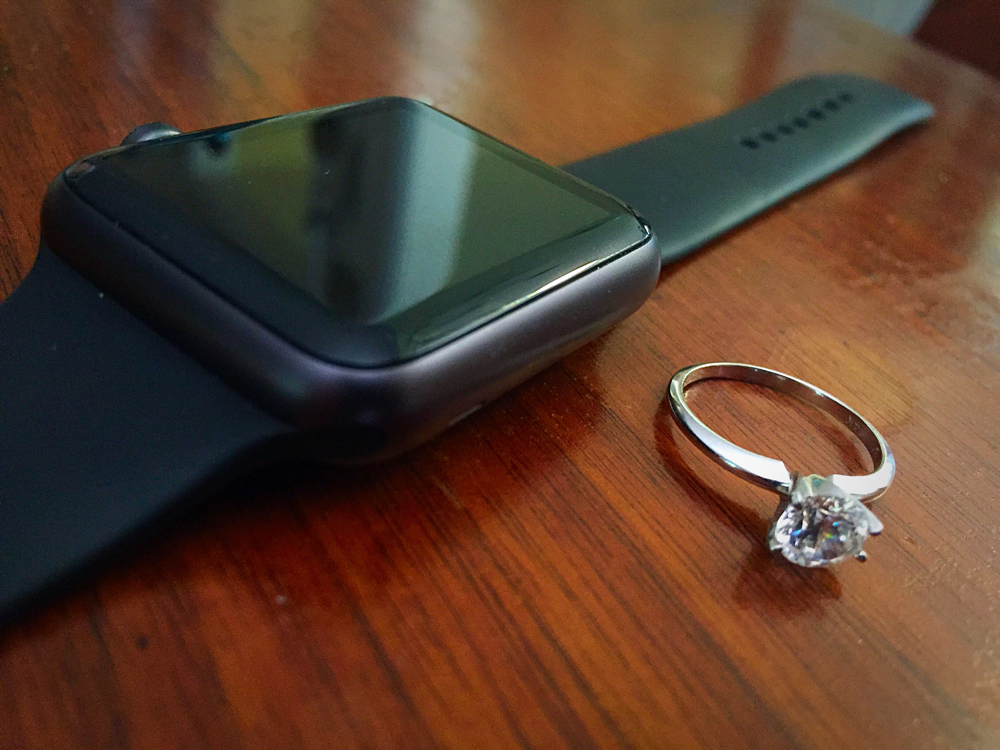
On "Breaking Up" With Apple Watch
Check out these headlines:
“A breakup letter to my Apple Watch” — Morgan Oliveira, Business Insider
“Why I’m Breaking Up With the Apple Watch” — Vanessa Friedman, NYT
“Apple Watch: Here Are 7 who dumped it” — Philip Elmer-Dewitt, Fortune
“I’m Dumping My Apple Watch” — Scott Kelby’s Photoshop Insider
“Why It’s Too Soon To Break Up With The Apple Watch” — Tim Bajarin, TIME
There have been a lot of inanities surrounding the preceding hype and succeeding spread of Apple Watch, some of which I’ve even been guilty of myself (mainly various timekeeping puns, though I’ll continue to actively not apologize for them). But the most absurd and seemingly enduring cliché comes in the form of the above-quoted, reflecting the weirdly anthropomorphized romantic desire that Apple Watch somehow draws out of its less-informed users.
These people — for whatever reason — invariably frame the thing as some kind of digital heartthrob (heart rate sensor notwithstanding) that’s slighted them in their quest for true love. I’ll grant that the last few listed are possibly less blatant, as “dump” is often used in lieu of “throw away” or “get rid of,” and Bajarin’s headline seems more referential (though it also appears to be deferential to the metaphor and therefore supportive of this nonsense). In general, and without any delusions of cleverness, these people are proud to frame a smartwatch as a human being, replete with the requisite expectations.
I wonder why that is (and not only because Siri will never be that good). Do people write Dear Johns to Xbox One and Galaxy S Whatever? Are there any breakup letters to those massive LG arm weights after they break users’ comparatively tiny, flimsy wrists? Do folks feel compelled to compare their personal computers to estranged partners and failed intimate connections?
There are two ways to go with this. One is that professional writers (yo!) are often a hackneyed bunch (yo?), operating on the assumption that the old, easy, tried-and-true takes about five seconds of actual thought and is good enough for the general public. That’s a valid angle, because it’s mostly true. People love Romeo and Juliet.
The second angle — and the more pathetic one — is that this blather is a sorry function of our evolving digital society, where the hardware/software windows to users’ online networks are as impactful in curating hope and fostering disappointment as the actual relationships those windows help seek out and nurture. Since the Internet’s become the biggest and most convenient dating tool on Earth, this comes as little surprise.
Regardless of context, many people think their accessories are what will make them better or more adept at what they’re actually accessorizing for. I remember as a kid learning to play roller hockey that simply having skates, a stick, a helmet, and some pavement wasn’t enough to make me really embrace the pastime. I needed the best metal frames with the slippery ABEC 7s, the most dextrous gloves, the best shinguards, the most expensive elbow pads. I needed the clear Lexan face shield because the metal grid wasn’t pro enough. I wasn’t impressed with the little orange ball, either — I had to have the gadgety street pucks with those little metal spheres embedded uselessly inside. And when I sucked anyways (as beginners invariably do), a part of me always blamed the gear and sought out better stuff. I thought I could improve passively by accessorizing further.
Such seems to be the case with a large swath of people when it comes to Apple kit, and it’s truer than ever with Apple Watch. For its part, Cupertino shares some of the blame for this, too. All this “our most personal device ever” business really bludgeoned home the notion that this was something capable of defining you — or, at the very least, that it could help you define (and so sell) yourself to others.
I’m not a fan of the vehicle. I’ve written about it before, and the Macalope has done it even better whenever it’s come up. And the second any one of these spurned mooks gets a free Android Wear or Pebble device to review, expect a lot of headlines about “cheating on the Apple Watch.”
Look: Apple Watch will not make you more popular. It will not make you a Facebook Cassanova. It will not make you love yourself or anyone else more than you otherwise could or should. It will not satisfy your emotional needs in a way that only another person can — the Taptic Engine simply isn’t that good. Yes, Apple makes lusty devices. They make gorgeous, tactile hunks of glass and metal that feel great to the touch and are strikingly lovely to look at. And yes, these beautiful computers and mobiles can replace many of the organizational tasks (to-dos, recipes, appointments, etc.) for which we traditionally rely on our significant others to keep our feet to the fire.
But at the end of the day, these things are all just tools.
And any person who gives them any more credence than that is an even bigger one.